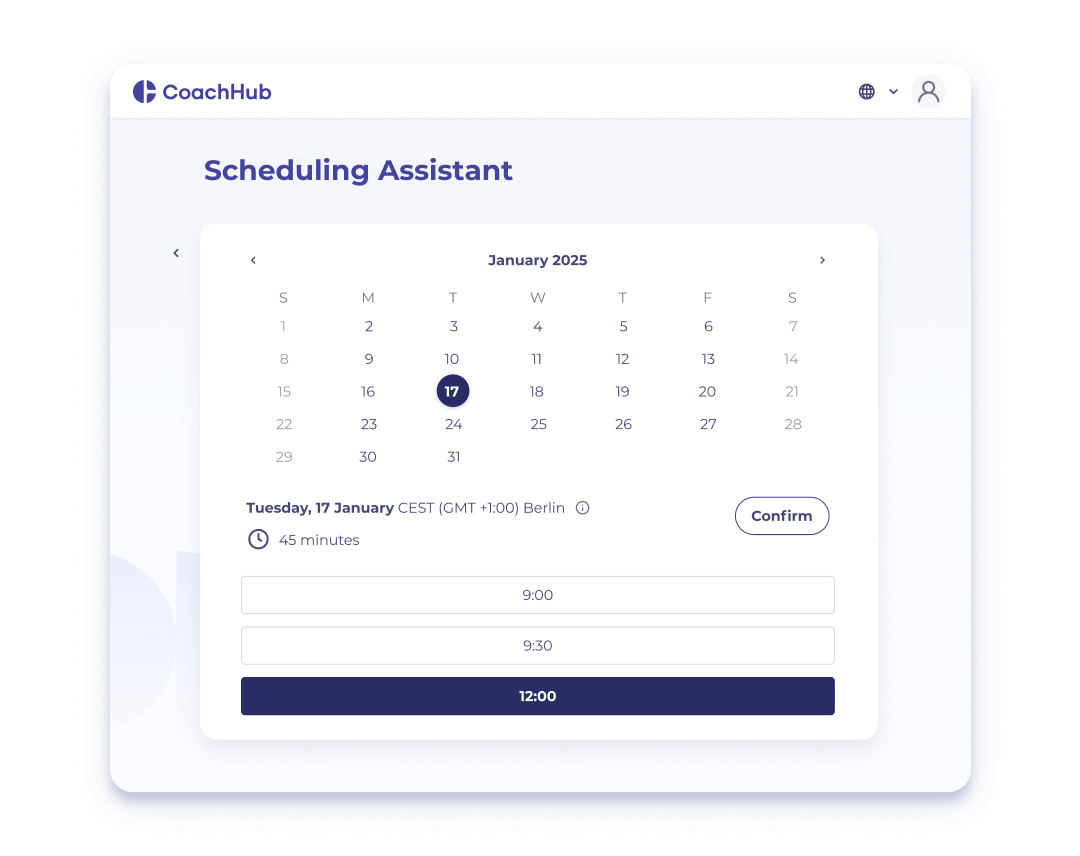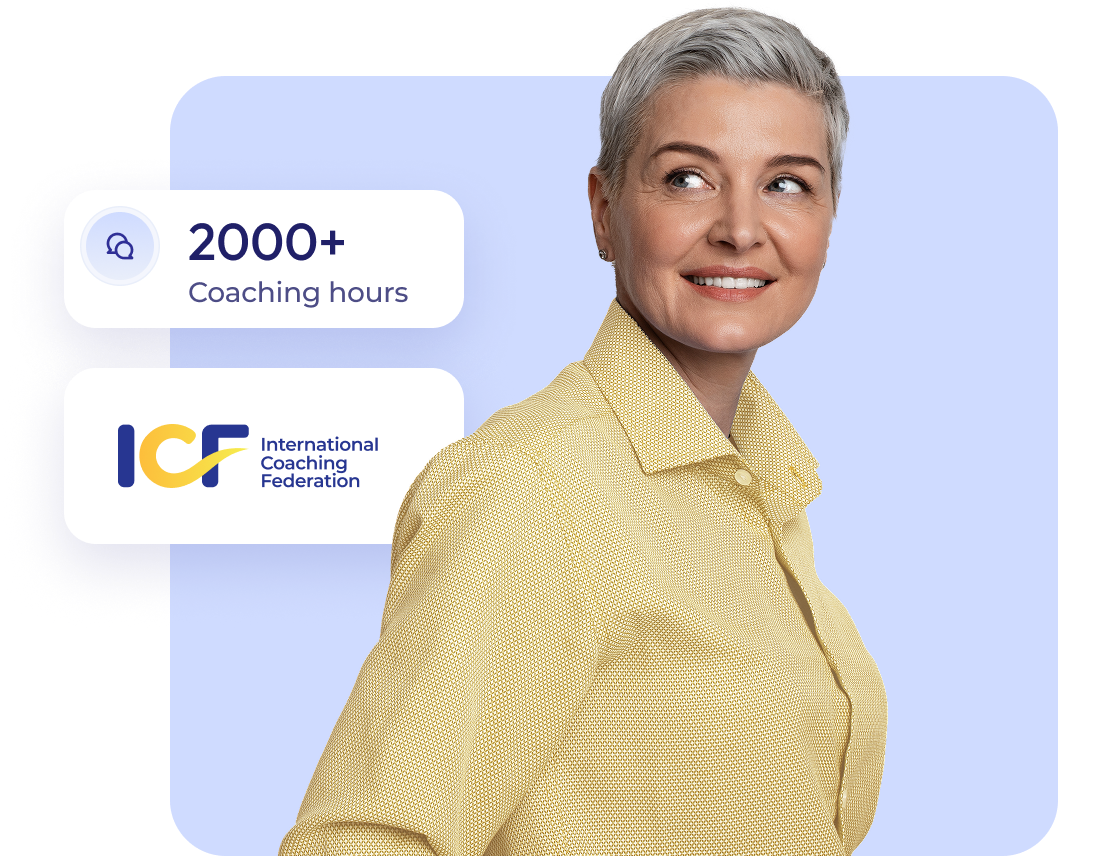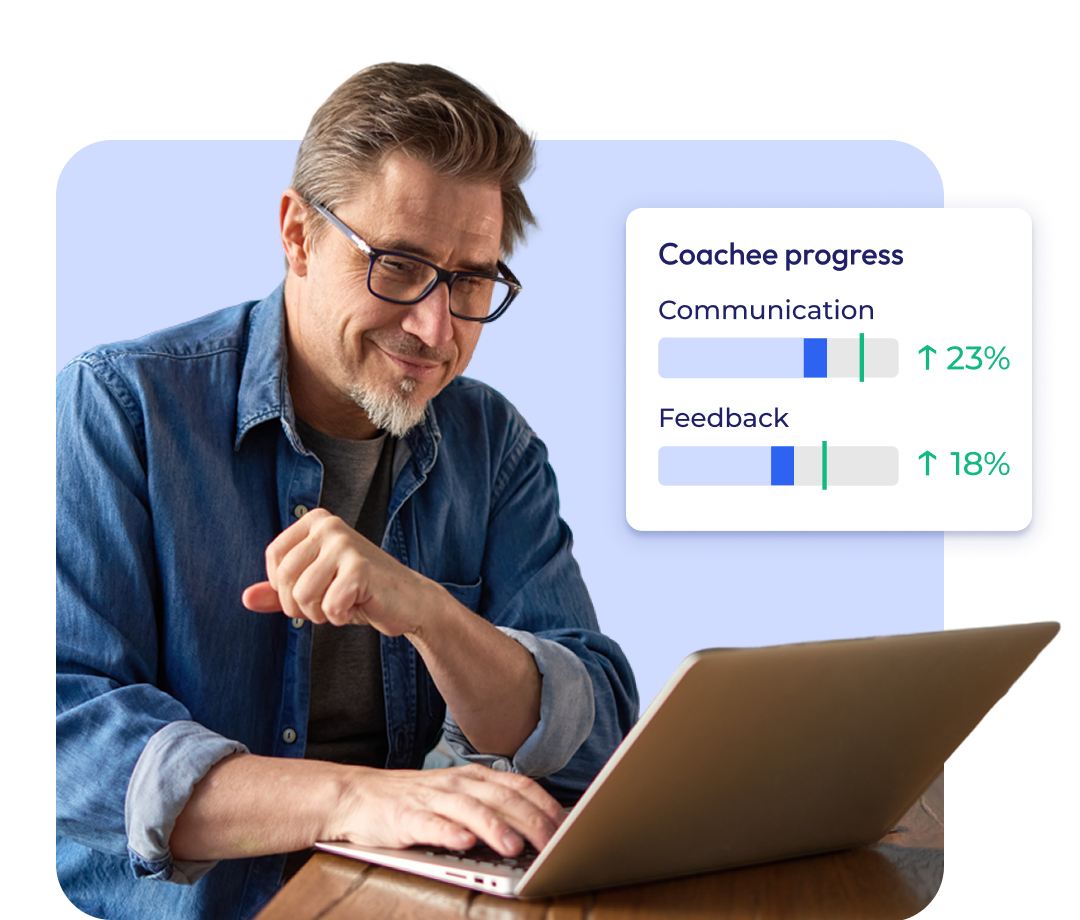EXECUTIVE COACHING SERVICES
Strategic coaching,
built for executive pace
Empower your leaders globally with elite coaches, data-driven insights and seamless delivery.


































Targeted programs for real executive challenges
Accelerated executive transition
Support new executives to clarify their mandate, align stakeholders and drive performance.
Global cohesion and execution
Guide executives leading across regions or functions to build shared priorities, clear decisions and reliable handoffs.
Sustainable leadership impact
Help executives pair purpose and performance, develop successors and sustain culture through change.
Executive coaching meets digital innovation
C-levels, VPs and senior leaders are matched with the top 3% of global coaches and equipped with tools designed for scale and growth.


From scheduling to coaching session in seconds
Executive time is invaluable. Assistants can seamlessly book standard 45-minute sessions or deep-dive 90-minute ones whenever leaders need support, eliminating scheduling headaches.
Executive coaches with boardroom experience
- Elite certified coachesYour leaders partner with our MCC or PCC certified coaches, with 2,000+ coaching hours experience and expertise in assessments (Hogan, DISC, MBTI, etc.).
- Expertise as former business leadersOur vetted coaches have first-hand experience leading at senior levels and have successfully coached C-suite and VP leaders across major organizations.
- International acumen and experienceOur executive coaches support your leaders in 40+ languages, drawing on deep cross-cultural experience leading international teams across regions.




Data-led coaching insights that fuel action
Executive coaching with intelligence behind every session.
CoachHub Insights™ ensures development is always data-backed. Leaders uncover blind spots, build momentum and show progress on the key focus areas that matter.

coachee satisfaction
Executive coaching services with 4.8 session rating
CoachHub Executive™ in action
White-glove onboarding
A Customer Success Manager provides personalized onboarding, while a Client Experience Manager supports executives and their assistant throughout the journey.
5
Curated coach matching
Ahead of the first session, the coach is briefed with client-specific objectives and organizational context. Leaders can request a new coach at any time if the fit isn’t right.
5
Flexible executive access
Executives have unlimited access to their coach. Assistants can easily book 45- or 90-minute sessions, including optional tripartite sessions with the executive’s manager.
5

Find out how CoachHub Executive™ transforms executive performance

Top 10 questions about our executive coaching services
Executive coaching helps senior leaders strengthen performance, make better decisions and lead with clarity in complex environments.
CoachHub Executive™ delivers these services through personalized programs led by the top 3% of ICF-certified global coaches (or equivalent certification). Each executive receives tailored sessions focused on the objectives of their program, while the digital CoachHub platform makes coaching seamless and scalable. Their asssitant can easily schedule their coaching session for them, leaders can access their coach anytime and they can track their progress over time through CoachHub Insights™.
The CoachHub Executive™ experience begins with white-glove onboarding, supported by a dedicated Customer Success team and a Client Experience Manager who guide each organization and its executives through every step.
Executives are then matched with the top 3% of global coaches, based on region, language and organizational context. Coaching sessions are easily scheduled through the platform or by executive assistants.
Progress is tracked with CoachHub Insights™, providing data-driven visibility into progress on focus areas, goal attainment, self-assessment and 360° feedback. This ensures every coaching program moves smoothly from onboarding to proven business outcomes.
CoachHub’s executive coaches are senior-level professionals who have led international teams and held leadership positions in major organizations. All coaches are ICF PCC- or MCC-certified, bringing an average of 2,000+ coaching hours and 10+ years of leadership experience.
Executives are matched with the right coach based on language, industry, leadership level and personal preferences. Ahead of the first session, each coach is briefed on the leader’s objectives and context, ensuring a fast and effective start.
Our coach matching success is 96%, but if the coach is not a fit, no worries, leaders can request a new one at anytime!
Executive coaching delivers measurable improvements in leadership effectiveness, decision-making and goal achievement.
Research shows that 40% of Fortune 500 companies rely on executive coaches to strengthen their senior leaders and 96% of leaders who have experienced coaching would do it again. After coaching, 56% of leaders report improved leadership effectiveness and 91% achieve higher goal attainment.
Moreover, with CoachHub Insights™, program managers can access anonymized data in real-time to measure the impact of their coaching program over time.
Yes, CoachHub Executive™ provides fully virtual coaching through a digital-first platform designed for global reach.
We provide executive coaching in 40+ languages. Leaders can connect to their coach anywhere and schedule coaching sessions at their convenience. The platform enables consistent, high-quality coaching experiences across regions, supported by local onboarding and multilingual customer teams.
CoachHub Executive™ offers three targeted coaching programs tailored to common leadership challenges:
- Accelerated Executive Transitions, helping newly appointed leaders clarify their mandate, align stakeholders and deliver quick impact.
- Global Cohesion and Execution, supporting executives leading across borders or functions to build shared priorities and streamline collaboration.
- Sustainable Leadership Impact, enabling leaders to pair purpose with performance, develop successors and sustain culture through change.
Each program combines elite coaching, digital tools and measurable insights to strengthen leadership at every level.
CoachHub stands out for its ability to combine elite coaching quality with digital scalability and measurable outcomes. Unlike traditional providers or in-house programs limited by geography or capacity, CoachHub offers access to the top 3% of certified executive coaches in over 90 countries and 40+ languages.
Our digital platform allows organizations to launch programs quickly, manage sessions seamlessly and track impact through CoachHub Insights™. This blend of human expertise and data-driven technology delivers consistency, global reach and proof of results at scale.
Yes, executive coaching is delivered across 90 countries in 40+ languages, with localized coach networks that meet the cultural and business needs of global organizations.
CoachHub Executive™ goes beyond one-to-one sessions by integrating technology, measurable insights and continuous learning into every coaching journey. Each executive benefits from personalized matching with certified coaches and flexible session formats to reinforce development between sessions.
While traditional coaching often lacks scalability or measurable tracking, CoachHub ensures impact visibility through data-driven dashboards, 24/7 scheduling flexibility and a consistent, high-quality experience for leaders worldwide, that can be tailored to your organization's goals.
Yes, executive coaching plays a key role in retaining and engaging senior leaders by giving them space to reflect, grow, and lead with purpose. Through individualized support, executives strengthen communication, decision-making and resilience — all of which drive engagement and long-term satisfaction.
With CoachHub Executive™, organizations not only see improved leadership performance but also greater alignment, motivation and confidence among their top talent, resulting in higher retention and a stronger leadership pipeline.
Trying to solve a different challenge?
.avif)
Women in leadership
Equip women in leadership with a business coach to accelerate professional development.
.avif)
Leadership development
Invest in your people and watch your organization thrive.




.svg)


.svg)








.png)


